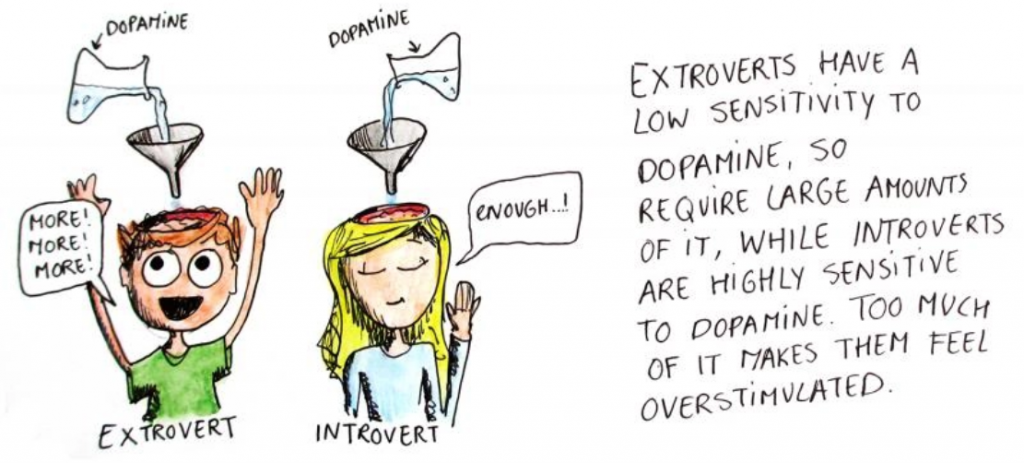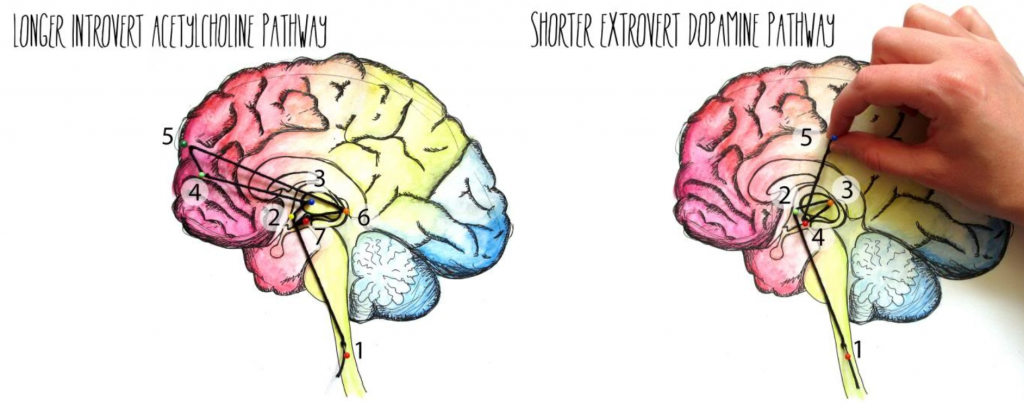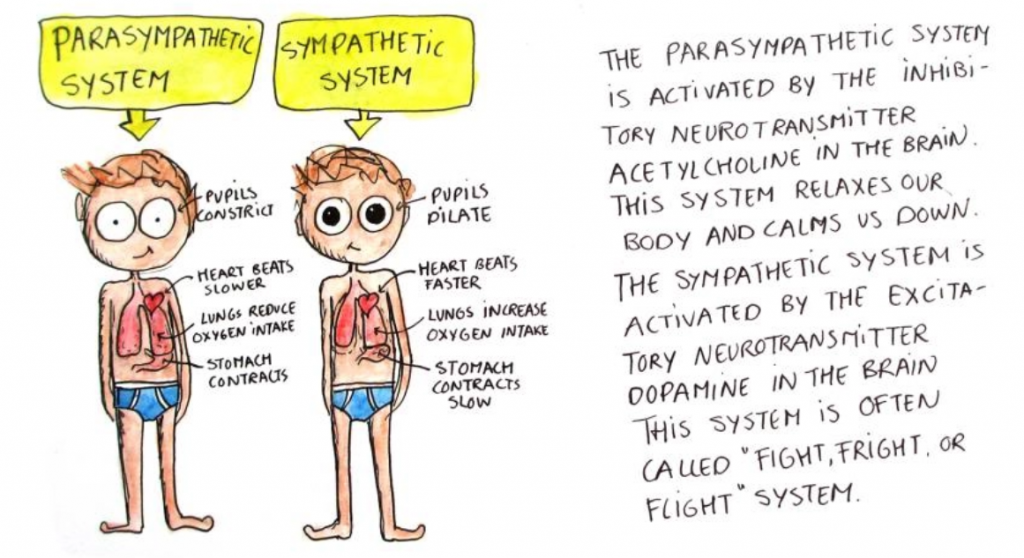
You come to an annual corporate party. There are lots of people you don’t even know. They’re chatting with each other loudly, making jokes and having fun or at least pretending to enjoy each other’s company. Meanwhile, you’re trying to smile but inside you’re totally exhausted. You’d rather be chilling at home. You have to focus on small talk with random people when you’d rather be watching Netflix. Chances are high then that you’re an introvert. This example raises the following question:
Why do extroverts love action and are so talkative while introverts prefer chilling at home in silence?
While I was analyzing what does it mean to be an introvert or an extrovert that question came to my mind. Finding just the differences in behavior seemed too trivial. That’s why I decided to go deeper and find the roots – why introverts and extroverts behave differently?
Let’s start with the basics
There are important neurotransmitters in your brain. Those are the chemical messages released by nerve cells to send signals to other cells. Now let’s focus on two of them – dopamine and acetylcholine. Dopamine gives you happiness when you take a risk or experience something new. Acetylcholine also brings you joy but in a different way. It makes you feel relaxed and calm.
Extroverts love dopamine
The brains of introverts and extroverts differ in the way they respond to dopamine. Introverts are highly sensitive to dopamine which is why they don’t need too much of it. Too much dopamine makes them feel overstimulated [1] which can be exhaustive. That’s why they don’t enjoy speaking in front of others or spending time in crowded places. It takes a lot of energy and they become overstimulated pretty quickly.
Extroverts, on the other hand, are less sensitive to dopamine. They need a lot of stimuli to feel happy. It means that they need to talk a lot, meet new people and expose themselves to some risk in order to feel satisfied. Speaking at conferences or partying with new people sounds like a great opportunity for them to have more dopamine. It’s a natural environment which they enjoy.

It’s not like dopamine works just for extroverts or they have more of it. Both types have the same amount of dopamine available. When there is a lot of dopamine in the blood, both extroverts and introverts become talkative and take risks.
Introverts love acetylcholine
According to what Christine Fonseca presents in her book entitled Quiet Kids: Help Your Introverted Child Succeed in an Extroverted World [2], introverts prefer using another neurotransmitter – acetylcholine. It’s also associated with feeling pleasure but in different situations.
Acetylcholine makes them feel good when they are focused on one thing only for a long period of time, when they can think deeply and reflect. That’s why they like to work alone, analyze issues and dive into books and movies.
They process information differently
Extroverts need less time to process information than introverts. Images, sounds, smells and other stimuli coming to an extrovert’s brain pass a shorter neural path [1]. In introverts the same information runs through more areas, including those associated with long-term memory and planning.
That’s why it can take longer for an introvert to make a decision or to speak up in front of others. They just need more time to process the information and think of exactly what they want to say. When you ask them an open question and there is a silence at the beginning it doesn’t mean they don’t like you or they don’t have nothing to say. They just need some time to process the information and formulate the response. It has nothing to do with intelligence or knowledge but rather the way their brains work.

Differences in the nervous system
Dr. Marti Olsen Laney describes another difference in her book entitled The Introvert Advantage: How to Thrive in an Extrovert World – the nervous system. Our nervous system is divided into two.
The sympathetic nervous system, which is responsible for making snap decisions and stimulating the body to “fight-or-flight” responses. And the parasympathetic nervous system, which is responsible for stimulation of “rest-and-digest” or “feed-and-breed” [3] activities that occur when our body is at rest.

Again, the preferences vary
Both extroverts’ and introverts’ reactions are based on the nervous system, just like it is in case of neurotransmitters. But again they’ve got different preferences.
Extroverts prefer using the sympathetic nervous system, which influences mobilization to discover new experiences and to work on “full throttle”. The brain becomes receptive to the surrounding and at the same time excessive thinking is limited. The body operates in the survival mode.
Introverts, on the other hand, prefer using the parasympathetic nervous system, which makes the body work in an “energy-saving mode”. Muscles are relaxed, blood pressure gets lower, and the energy is stored. The body digests food and accumulates the energy for the future.
Conclusion
Now you can understand why extroverts and introverts are so different. It boils down to how our brains work. However, you need to remember that the division into these two personalities is not simply black and white [4]. I like the way Dr. Marti Olsen Laney explains it in her book entitled The Hidden Gifts of the Introverted Child:
“Introversion and extroversion are not black and white. No one is completely one way or another — we all must function at times on either side of the continuum”
References
[1] Marti Olsen Laney. (2002). The Introvert Advantage: How to Thrive in an Extrovert World. Workman Publishing Company.
[2] Christine Fonseca. (2013). Quiet Kids: Help Your Introverted Child Succeed in an Extroverted World. Prufrock Press.
[3] McCorry, Laurie. (2007). Physiology of the Autonomic Nervous System. American journal of pharmaceutical education. 71. 78. 10.5688/aj710478.
[4] Marti Olsen Laney. (2005). The Hidden Gifts of the Introverted Child: Helping Your Child Thrive in an Extroverted World. Workman Publishing Company.